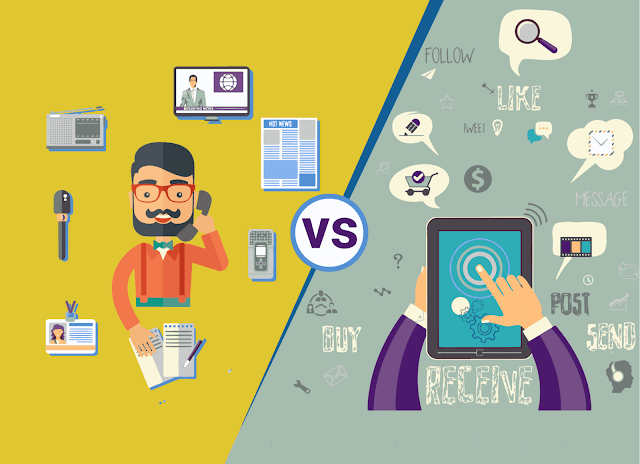In today's fast-paced world, businesses have a plethora of options to reach their target audience. Marketing, the art of promoting products or services, has evolved significantly. Two primary avenues have emerged: digital marketing channels and traditional marketing channels. Let's delve into the characteristics, advantages, and differences between these two approaches.
Digital Marketing Channels
Digital marketing leverages internet-based platforms and technologies to reach consumers. These channels include:
Social Media Marketing: Utilizing platforms like Facebook, Instagram, Twitter, and LinkedIn to engage and connect with the audience through content, ads, and interactions.
Search Engine Optimization (SEO): Optimizing websites to improve visibility and ranking on search engine results pages (SERPs), thereby driving organic (unpaid) traffic.
Content Marketing: Creating and sharing valuable content (blogs, videos, infographics) to attract and retain a target audience.
Email Marketing: Sending personalized messages to prospects and customers to promote products, offers, or updates.
Advantages of Digital Marketing Channels:
Targeted Reach: Precise targeting allows businesses to reach specific demographics, interests, and behaviors.
Measurable Results: Metrics such as clicks, conversions, and engagement rates enable precise tracking and analysis of campaigns.
Cost-Effectiveness: Digital channels often offer lower entry costs compared to traditional methods, enabling even small businesses to compete effectively.
Real-Time Engagement: Instant communication and feedback allow for immediate adjustments and interactions with the audience.
Traditional Marketing Channels
Traditional marketing involves conventional methods that existed before the digital era, including:
Television Advertising: Commercials aired on television networks to reach a broad audience.
Print Media: Advertising through newspapers, magazines, brochures, and flyers.
Radio Advertising: Promoting products or services through radio broadcasts.
Outdoor Advertising: Billboards, posters, and banners placed in high-traffic areas.
Advantages of Traditional Marketing Channels:
Wide Audience Reach: Traditional methods historically reached a broad audience without internet access.
Tangible Presence: Physical advertisements create a lasting impression through tangible mediums.
Established Credibility: Consumers might perceive established traditional outlets as more credible due to their longevity.
Differences Between Digital and Traditional Marketing Channels
Reach and Targeting: Digital marketing allows for precise targeting, reaching specific audiences, whereas traditional methods often target broader demographics.
Cost: Digital marketing can be more cost-effective, offering various budget-friendly options, while traditional marketing, especially TV or print ads, can be more expensive.
Measurability: Digital channels provide detailed metrics for analyzing campaign performance, while traditional methods often lack precise tracking capabilities.
Flexibility and Interactivity: Digital channels allow for real-time interaction and immediate adjustments, whereas traditional marketing has limited interactivity and flexibility.
In conclusion, both digital and traditional marketing channels offer unique advantages and cater to diverse audiences. The choice between them depends on factors like budget, target audience, and campaign objectives. Combining strategies from both realms can often yield the most comprehensive and effective marketing approach.
Understanding the nuances of each channel empowers businesses to craft strategies that resonate with their audience, foster engagement, and achieve their marketing goals in today's dynamic landscape.
Facebook - https://www.facebook.com/profile.php?id=61554432667821
Twitter - https://twitter.com/submission_site
Linkedin - https://www.linkedin.com/in/top-submissionsites-9412aa299/
Pinterest - https://www.pinterest.com/m8208736/
Instagram - https://www.instagram.com/submissionsites/
Reddit - https://www.reddit.com/user/topsubmission_sites
Email - [email protected]




